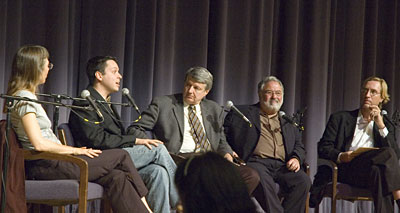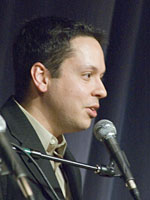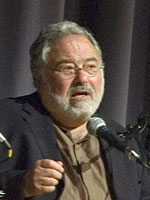UC Berkeley Web Feature
 |
Joan Blades (MoveOn.org), Markos Moulitsas (DailyKos), and UC Berkeley professors Bruce Cain, George Lakoff, and Paul Pierson at the "What Are Americans Voting For?" forum. (BAP photos) |
Blue-chip progressive panel calls for more values-based politicking
BERKELEY – Values, not issues, are what the Democratic Party should be talking about in this election and beyond, according to the panel of progressive movers and shakers who addressed a packed Wheeler Hall on campus Thursday night. They stressed values such as fairness and community (and cooperation and trust, their antecedents), saying they transcend both geography and the outdated idea of a left-center-right political spectrum, and speak to voters on an effective gut level.
At the same time, panelists said, progressives need to think long-term, and continue building an infrastructure that can disseminate ideas as effectively as the conservative network of think tanks and talk radio shows, without falling into the trap of creating "issue silos."
The "What Are Americans Voting For?" panelists included Joan Blades, cofounder of the progressive, 3.2 million-member juggernaut MoveOn.org (and a Berkeley alumna, '77); Markos Moulitsas, founder of DailyKos, the most-read political blog in the world, with 20 million visitors monthly; and George Lakoff, UC Berkeley cognitive science professor and best-selling author of several treatises on effective political language.
Pinch-hitting for Berkeley public policy professor Robert Reich, secretary of labor under President Clinton, who had a family emergency, was Paul Pierson. A Berkeley political science professor, Pierson is the author of an influential recent book about how the current incarnation of the Republican Party rose to power.
 'We have a party that used to be focused on a few battleground states, and now we're competing in places like Wyoming, Nebraska, and even Idaho. If it were up to the party in D.C., those races would not be competitive. But Howard Dean has completely changed the equation.' -Markos Moulitsas DailyKos founder |
"I suppose the panel is fair and balanced the way Fox News is 'fair and balanced,'" joked moderator Bruce Cain, director of Berkeley's Institute of Governmental Studies, acknowledging the absence of any conservative viewpoints. "Tonight we're going to have an opportunity to have a discussion about what's happening inside progressive politics without worrying about bantering with Republicans."
Professional progressives
While all four panelists are progressives, they're of decidedly different flavors. If Blades is a grassroots activist in the traditional mold, then Moulitsas is a radical, take-no-prisoners "Netroots" version. Lakoff, whose theories of framing made him the darling of the Democratic party in 2004 and the subject of a New York Times Magazine feature story, is an academic-turned-insider. Sitting in for the missing Reich (an insider-turned-academic), Pierson believes that organizational and institutional infrastructure play much bigger roles in American politics than methods of communication.
Moulitsas and DailyKos's community of 800,000 active bloggers are credited with almost singlehandedly catapulting challenger Ned Lamont to victory against Sen. Joe Lieberman in the Connecticut Democratic primary in August, forcing Lieberman to run as an independent next week. "People actually made a difference in these elections," Moulitsas said proudly. But he clarified that he thinks elections are won by teams, and that the Netroots are just one piece of the puzzle. "We can funnel activists, volunteers, a little bit of money, and that can make a lot of difference."
The challenge for progressive-minded election teams, he argued, is that the modern political process has become about turning people off, not on, so that only the "most committed, rabid partisans" show up to vote. Progressives need to tap their activists to get everyone, not just partisans, to the polls in the same way that the Republican Party traditionally has done through its networks of churches and civic organizations.
To Moulitsas, that also means no district, no matter how "red," should be left behind. "We have a party that used to be focused on a few battleground states, and now we're competing in places like Wyoming, Nebraska, and even Idaho," he said. "If it were up to the party in D.C., those races would not be competitive. But Howard Dean has completely changed the equation."
Instead of talking about divisive issues "in the way that Republicans want us to talk about them," he said, Democrats must talk about the values underpinning those issues. Republicans, for example, love to push Democrats to talk about gay marriage, but smart Democrats in "red" districts can turn it into a discussion about fairness, as Paul Hackett did in Ohio.
"And nobody is against fairness," Moulitsas smiled. "There's nothing incompatible with those values, whether you're a Nebraska Democrat or a Berkeley Democrat."
Values appeal to the emotions, while issues appeal to the intellect. Moulitsas said that for too long, progressives have "tried to appeal to voters based on intellect, while the Republicans are hitting them right here in the gut. And guess what's winning?" He thinks it's understandable that Americans don't have time to follow politics the way he and most of the Berkeley audience presumably do, which is why progressives need to learn to tap emotion and passion more effectively.
A breakdown of family values
Lakoff, whose views are sometimes reduced by critics to the idea that the Democrats are the "mommy party" and the Republicans are the "daddy party," gave a brief, nuanced background on why he thinks politics come down to family values. In 1994, when he picked up a "Contract with America" booklet, he was mystified, he recalls. "Why were people who were against abortion also in favor of the flat tax? I realized that this was a cognitive science problem." That being his field, he tackled it.
What he found to unite these disparate stances, he explained, was an ideological schema of the family — everyone's "first experience of governance." Conservatives see the government's role as that of a "strict father": the philosophy of every man for himself (emphasizing, for example, pulling oneself up by one's bootstraps), where those who fail or break the rules are punished. Progressives, meanwhile, see government's ideal role as that of a "nurturant parent," in which "we're all in this together" and therefore believe in social safety nets, second chances, and community-based programs. (For more about this worldview, read the NewsCenter's October 2003 Q&A with Lakoff, "Framing the Issues.")
The most important element of the family-values frame, Lakoff argued, is that it's not either/or: everybody relies on some of both the strict-father and nurturant-parent philosophies. "There are lots of people in this country who are conservative in parts of their lives and progressive in others," he said. "Plenty of people identify as conservatives but love the land, or are progressive in their religious values. There are honest, progressive businesspeople who treat their employees well."
In short, there are a great many areas where residents have progressive values but call themselves conservative, and those are the voters Democrats should be trying to reach, Lakoff concluded.
Levees that some want to see break
Pierson objects to framing as it supports the "senior class president" view, in which elections are essentially a popularity contest between two candidates. "By definition, the candidate who wins must be the one closest to the electorate," he explained. (For a more detailed explanation, read the Berkeleyan's January 2006 article about Pierson, "The Republican Right, and How It Grew.") That's why candidates' teams focus on whatever messages they think will resonate most with voters, and use framing as spin — "I'm not saying these things are unimportant, but they're just one part," he said with a nod to Lakoff.
 'We have a gratitude deficit. We've got people who risked their lives to come here to do all these jobs that make our lifestyle easier and possible, and at the least we ought to thank some folks, and maybe let them have health care and educate their kids and get driver's licenses.' -George Lakoff, UC Berkeley linguistics professor |
The real problem with the "senior class president" model, Pierson continued, is that it omits from the picture the powerful roles played by organizations and institutions. The contest is not just between two candidates: it is also a battle between their funding sources, think tanks and other information-delivery groups, and influence networks. And right now, it is not a level playing field, he said: Republicans possess far greater resources and coordination.
Pierson evoked a metaphor drawn from Hurricane Katrina to describe how, despite the progressive movement's increasing power, it could still fail to win the 15 seats needed for a Democratic majority in the House: "It's about the size of the wave, but it's also about the strength of the levees" — the organizational and institutional forces around the country.
Blades said that while the energy of the grassroots gave her hope for the outcome of the midterm elections, "those levees feel mighty high sometimes." That's why she left MoveOn.org in volunteers' capable hands to cofound another group, MomsRising, to reach out to the half of the country's population that didn't vote in the 2004 election. She said she hoped that focusing on mothers would appeal to people turned off by partisanship.
"Moms — very few people are against them," she joked. "Most of us have one. If you're not one, you know one. So when you learn that there's deep discrimination against mothers in this country, it's shocking." A single mother, she said, earns 33 percent less than a man with the same education level employed in the same job. The difference between genders is 27 percent for married mothers.
This is an issue that comes down fairness, one that "I think a lot of Americans can get behind," Blades said.
Moulitsas had a different take on how level the playing field really was. "The 'vast right wing conspiracy' spends $400 million a year" on think tanks and conservative publications, he said. Meanwhile, the top six environmental groups have an annual budget totaling close to $700 million.
"The money's on our side. The difference is, we put it in our 'issue silos,'" Moulitsas complained. Progressive organizations need to be less territorial, and pool their resources to be used for a wide variety of outreach and activism efforts, not just on sponsoring legislation designed specifically for "their" issue.
Paper trails and the 'illegals'
Reading a question submitted by an audience member, Cain asked the panelists whether they were concerned about the integrity of the voting system. It is one of the three top issues that MoveOn.org members want to focus on, Blades replied, just after clean renewable energy and health care. (MoveOn has apparently not gotten the memo on values-not-issues positioning.) "People have been stealing elections since elections existed. You have to put in protections," she said.
A question about the Democratic stance on illegal immigration allowed Lakoff to demonstrate how the way an issue is framed changes one's perception of it. By discussing the problem as "illegal immigration," immigrants' actions are criminalized, he noted. What if instead we defined the problem as "illegal employment and illegal employers?" he asked innocently. After all, he said, it's easier to find employers and check up on them. And if there were no illegal employers, there would be no jobs for illegal aliens and the problem would solve itself; immigrants would stay home.
"But of course the result of that would be an absolute disaster," he smiled. The lifestyle of upper- and middle-class Americans, particularly in California, depends on immigrants. "If [immigrants] weren't taking care of children and cleaning houses, then you wouldn't be able to have two people in the household working, for example. If they weren't picking vegetables and flipping burgers, we wouldn't be able to have cheap food."
Crystal ball tossing
Asked to prognosticate about 2008's presidential candidates, the panelists more or less demurred, saying that much would be determined by next week's congressional turnover (or lack thereof). Moulitsas volunteered that on his recent national book tour, the question always came up of "what do we do about Hillary [New York's Senator Clinton]," the conventional wisdom's choice for the Democratic Party's nominee.
"She really hasn't shown leadership in anything that matters," Moulitsas criticized, and that is also true of Illinois Sen. (and Democratic heartthrob) Barack Obama. "There's a serious leadership deficit in our party. I think Obama's going to be hit pretty hard, too, because I can't think of a single thing he's shown leadership in. He hasn't even been in the Senate very long."
| Panelist bios Joan Blades: Lawyer and mediator, cofounder most recently of Moveon.org and Momsrising.org, previously cofounded Berkeley Systems, a software company. She is the author of several books, including 2006's "The Motherhood Manifesto: What America's Moms Want - and What To Do About It" (with Kristin Rowe-Finkbeiner). George Lakoff: professor of linguistics at UC Berkeley, senior fellow of the Rockridge Institute and author of many books, including "Don't Think of an Elephant: Know Your Values and Frame the Debate," "Whose Freedom?: The Battle Over America's Most Important Idea," and " Thinking Points: Communicating Our American Values and Vision." Markos Moulitsas: Attorney and former U.S. Army officer; founder of the political blog DailyKos; coauthor of "Crashing the Gate: Netroots, Grassroots, and the Rise of People-Powered Politics." Paul Pierson: Professor of political science at UC Berkeley, author of "The New Politics of the Welfare State" and coauthor of "Off Center: The Republican Revolution and the Erosion of American Democracy." Bruce Cain (moderator): Robson Professor of Political Sciences, director of the Institute of Governmental Studies and of the University of California Washington Center. |
As for how progressives will fare in next week's contests, the four were reluctant to throw out predictions. Moulitsas claimed that he's never correctly predicted an election, so he was "happy that I'm feeling pessimistic about it." He hedged by saying he thought that if Pierson's levees held, Democrats would pick up 10 to 17 seats in the House, and if the wave was big enough, 30 to 35. Blades confined herself to hoping for a "really good turnout" among voters.
Pierson — after pausing to note how strange it was that the topic of Iraq had not come up at all in the evening's discussion, considering its powerful influence on voters' behavior — predicted the Democrats would pick up 22 to 25 House seats and that the Senate would stay split 50-50.
Lakoff professed to be nervous, for several reasons. A source in a position to know had told him that Republicans "have organized 60,000 people in California alone, through the churches, to make telephone calls in the last 72 hours before the election," he said, adding he doubted Democrats could match that kind of outreach. He also thought that the Democratic tactic of framing the election as a "referendum" on the Republicans, which "means they're trying to say nothing and let the Republicans fall on their faces," could easily backfire.
Although President George W. Bush's press conference this week was encouraging in the pratfall department to Lakoff. "We had an announcement from the White House that they were not 'staying the course" in Iraq," he said, noting with some glee that "when you negate a frame, you keep the frame." In this case, by having invoked over and over a metaphor of moral certainty, backbone, and goal-oriented achievement, by backpedaling on it the White House had made themselves look weak. (Lakoff has an op-ed in the New York Times today, "Staying the Course Right Over a Cliff," on the subject.)
After the fast-paced, two-hour discussion ended, the panelists headed to the lobby to sign copies of their books.
Audience member Duane Vickrey, Social Welfare '03 and M.A. '05, said he had gotten what he came for: a sense of the direction of progressive thinking and strategies for the future. He agreed wholeheartedly with the evening's emphasis that "we need to look at values and issues that resonate with Americans across the board, not just in the progressive community."
And while he, too, thought that progressive think tanks were a critical component for growth going forward, "we don't have 30 years to build that infrastructure," Vickrey said impatiently. It had occurred to him during the event, he went on, that blogs like DailyKos and Firedoglake represent a radical new grassroots substitute.
"They're a hugely successful environment where ideas are being developed and discussed, using something like the public commons," he praised. "They're making a big difference, I think."
The event was cosponsored by the Center on Institutions and Governance, the Center on Politics at the Institute of Governmental Studies, the Rockridge Institute, and the World Affairs Council. A webcast is expected to be available from the World Affairs Council on Monday, Oct. 30.

